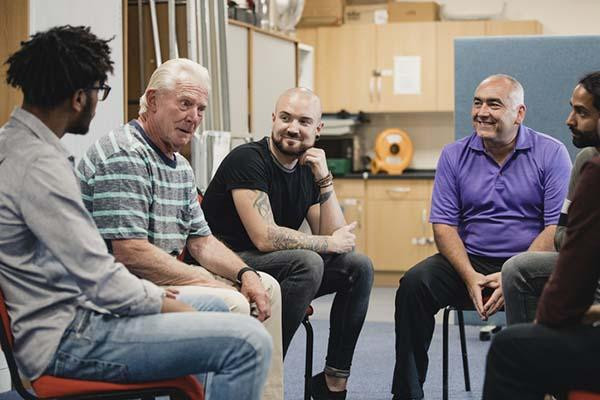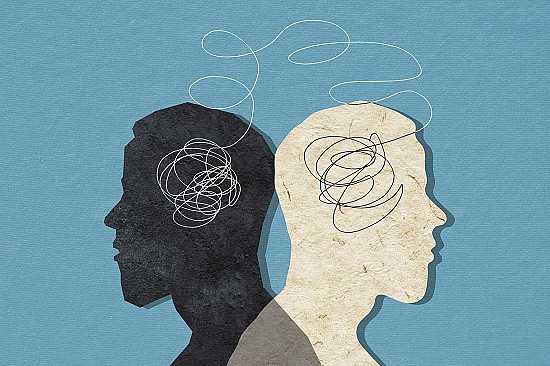How does prostate cancer treatment affect mental health?
Struggling with masculinity and body image is normal after treatment, though many men are able to accept the changes.
- Reviewed by Marc B. Garnick, MD, Editor in Chief, Harvard Medical School Annual Report on Prostate Diseases; Editorial Advisory Board Member, Harvard Health Publishing

The long-term outlook for men diagnosed with prostate cancer continues to improve. About 98% are living for 10 years or more after diagnosis, and the survival rate at 15 years now exceeds 95%. These medical advances, however, have also drawn attention to the mental health challenges many survivors encounter.
Treatment side effects (including erectile dysfunction, incontinence, hot flashes, and fatigue, among others) can impose a psychological toll. Doctors have gotten better at managing these complications, and many men do recover to some degree, yet it’s still common for survivors to struggle with loss of masculine self-esteem and changes in body image.
Navigating change
No amount of preparation can fully replace the experience of going through these changes. Still, many prostate cancer survivors describe feeling rushed into making treatment decisions without enough up-front discussion about potential side effects, leading to regrets or second-guessing later on. Patients in general say they would have felt better prepared for cancer treatment with a more comprehensive understanding of what to expect.
For these reasons, experts emphasize the importance of open communication with the medical team before treatment begins. Having detailed conversations about therapeutic options, potential side effects, and expected outcomes can help men decide which choices align best with their values and quality-of-life goals. Involving family members can help — partners are often supportive.
Initially after treatment, men are apt to view changes to their masculinity, body image, and self-esteem negatively. Erectile dysfunction can be especially difficult for younger men, as it disrupts their ideal of natural, spontaneous sexual performance. Physical weakness also introduces new limitations; some men may hesitate to spend long periods away from home because of concerns about incontinence.
Men with the strongest masculine ideals typically have the hardest time accommodating their illness, leaving them angry or depressed. Many men cite long-term changes to sexual functioning as well as the cancer’s possible return as their greatest worries.
Over time, however, psychological burdens may lessen as men begin to accept their new lives as cancer survivors. Experts say an important part of this adjustment entails reframing masculinity by adopting new ideals and letting go of others. Mentoring in prostate cancer support groups, for instance, can help men reaffirm their masculinity and regain confidence.
Seeing positives
Some cancer survivors say they feel more laid back and less aggressive on hormonal therapies that suppress testosterone. Others describe more openness in their relationships, stemming from their illness experience. Renegotiating intimacy to focus more on hugging and kissing can also be beneficial. For some older men, the loss of libido after treatment may even bring a sense of relief.
Exercise also improves mental health, even for men with advanced metastatic prostate cancer. Experts recommend aiming for 150 to 300 minutes of moderate-intensity or 75 to 150 minutes of vigorous exercise per week under a doctor’s guidance.
Ultimately, cancer treatment entails what many men see as an acceptable tradeoff between side effects and a longer life. Yet men should also go into treatment anticipating the changes they will likely experience.
“Having patients more fully understand both the short- and longer-term side effects will help ensure that treatment decisions are correct for the individual,” says Dr. Marc Garnick, the Gorman Brothers Professor of Medicine at Harvard Medical School and Beth Israel Deaconess Medical Center, and editor in chief of the Harvard Medical School Guide to Prostate Diseases. “Prostate cancer support groups can help to explain issues surrounding incontinence, erectile dysfunction, and alterations to body image. As a prostate cancer specialist, I strongly urge patients and their partners and spouses to seek out this readily available assistance.”
About the Author

C.W. Schmidt, Editor, Harvard Medical School Annual Report on Prostate Diseases
About the Reviewer

Marc B. Garnick, MD, Editor in Chief, Harvard Medical School Annual Report on Prostate Diseases; Editorial Advisory Board Member, Harvard Health Publishing
Disclaimer:
As a service to our readers, Harvard Health Publishing provides access to our library of archived content. Please note the date of last review or update on all articles.
No content on this site, regardless of date, should ever be used as a substitute for direct medical advice from your doctor or other qualified clinician.















